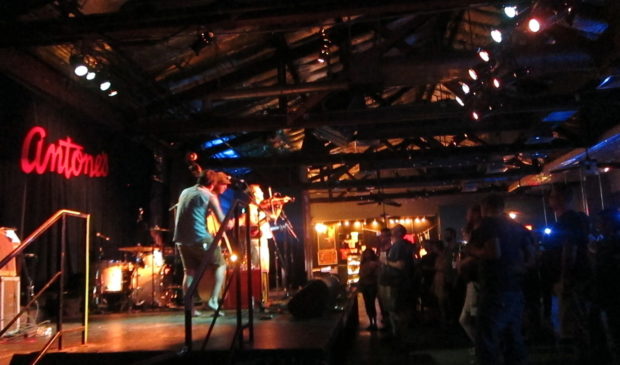City, music groups seek partners for update of 2015 creative ecosystem census
Wednesday, May 18, 2022 by
Chad Swiatecki The 2015 census that showed the Austin music and creative community was becoming economically marginalized will be updated this summer, with organizers hoping to reach a larger and more diverse pool of respondents from the Austin area and beyond.
More than a dozen nonprofit, media and governmental organizations have signed on to help gather data from local musicians, with the resulting report providing a baseline for policy decisions for the city and programming and operational steps for creative groups involved in the livelihood of local musicians.
The census will open June 20 with lead organization from KUTX, Sound Music Cities and Mayor Steve Adler. Community engagement partners include Austin Community College’s music business program, Austin Creative Alliance, Austin Economic Development Corporation, Austin Music Foundation, ATX Musicians, Black Fret, Do512, EQ Austin, Health Alliance for Austin Musicians, and Juice Consulting.
The 2015 census, which received about 4,000 responses, showed that stagnating pay and the city’s rising cost of living were the greatest concerns for local musicians, with about one-third earning $15,000 or less annually from their music career. Other issues included a fragmentation of various sectors of the music industry, music entrepreneurs being underserved in the business community, and the rapidly changing tastes and consumer behaviors of music fans.
Don Pitts, former head of the city’s Music and Entertainment Division and co-founder of the Sound Music Cities consulting group, said an update to the census has been discussed for years but was delayed in part by the Covid-19 pandemic. He said the involvement of more community groups in the new census is crucial for achieving the goal of gaining more responses and looking at factors such as equity and educational opportunities that are significant determinants of a healthy music ecosystem.
“In our experience, survey results reach a level of confidence when the number of respondents approaches critical mass relative to the total number of musicians and industry workers in the community being reviewed,” he said via email. “The 2015 Austin Music Census set the bar high at 4,000 respondents, more than any other city that has embarked on an initiative such as this. Our goal is to match that or improve on it.”
Pitts said discussions are ongoing with media partners such as KUTX to hold events and promotional campaigns to publicize the findings of the census. He added, “In addition, we will release a series of infographics of the data that we hope will inspire the grassroots organizations to lead their own community conversation or join in with others.”
Jennifer Dugas, CEO and executive director of Austin Music Foundation, said the 2015 census helped her organization create and revise its programs and events to best serve aspiring musicians. She said getting a more expansive look at the state of the local music industry will help AMF make similar changes in 2022 and beyond.
“For AMF and our partners this data helps to inform what we do programmatically in terms of the services we provide. The census is something we heavily rely on and in speaking to our nonprofit partners, we don’t have the current data to say, here is what we should be doing.”
“We’re in direct contact with artists all the time,” she added, “but there’s not the hard data to point back to, and for the city, mayor and Economic Development Department it is critically important to be able to show these are the needs of our community.”
Nagavalli Medicharla, chair of EQ Austin and a member of the city’s Music Commission, said the census process will be helpful in starting conversations about the priorities for improving the quality of life and economic prospects for local musicians.
“Good data will help the city and the music community in making informed decisions. It will also help in advocating for solutions to what are well-acknowledged or talked-about issues, but may be currently backed up with only anecdotal data,” she wrote via email. “This census survey will be broadly inclusive vis-a-vis Austin’s diverse music communities. This is crucial for the success of the survey. Good data will also be useful to stimulate broader community ownership and move us closer to consensus on various issues.”
Groups interested in participating in the census may email info@soundmusiccities.com.
Photo made available through a Creative Commons license.
The Austin Monitor’s work is made possible by donations from the community. Though our reporting covers donors from time to time, we are careful to keep business and editorial efforts separate while maintaining transparency. A complete list of donors is available here, and our code of ethics is explained here.
You're a community leader
And we’re honored you look to us for serious, in-depth news. You know a strong community needs local and dedicated watchdog reporting. We’re here for you and that won’t change. Now will you take the powerful next step and support our nonprofit news organization?




